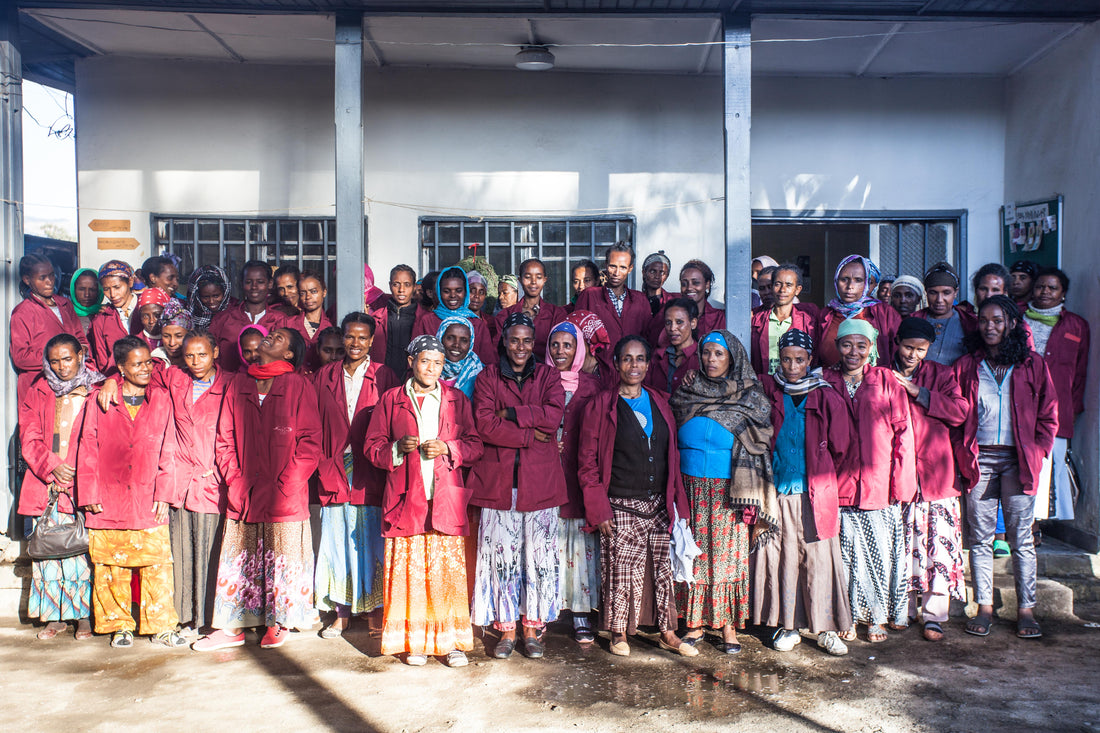

Since 2015, Fair Anita has been working with a women’s artisan cooperative located just outside the capital of Addis Ababa in Ethiopia. Best known for transforming bullet casings from war into beautiful beaded jewelry, these women strive not only to provide for themselves and their families, but also to break down cycles of poverty and patriarchy in their daily lives. It is impossible to understand the political, economic and social realities of Ethiopian women without acknowledging their hard work and courage. Through Fair Anita’s partnership with this collective, we hope to not only bring beautiful jewelry to our clients, but also to reflect on these women’s stories in order to better represent the meaning behind our best-selling collection.
In order to understand the women behind our Ethiopia Collection, we must first connect the past to the present. Located on the Horn of Africa, Ethiopia is estimated to be over 2,000 years old, making it one of the oldest countries in the word. Despite this 2,000 year legacy, in the past 100 years the country has experienced drastic political change. Ethiopia has been governed by four political regimes since the 1930s: the Salassie monarchy, the Italian occupation, the Derg socialist regime and the present day Federal Democratic Republic of Ethiopia. During the last political transition, Ethiopia was drawn into a border war with Eritrea, an event that cost almost 100,000 lives in exchange for minimal border adjustments. It is from this political legacy that our artisan partners transform tools of war into symbols of peace.
Female artisan products represent only a fraction of the total Ethiopian economy. Fair Anita employs about 150 female artisans in Ethiopia, but the vast majority of the population works in the agricultural sector. Although Ethiopia has one of the fastest growing economies in Africa, it is still one of the poorest countries in the world. The average income per person per year is US$2,000, but women receive significantly less income on average due to the lack of national minimum wage laws and societal norms that prevent equal pay for equal work. By providing fair wages and sustainable jobs, Fair Anita seeks to help women break through these economic barriers.
Underlying these political and economic conditions is a highly diverse society. Ethiopian society is organized along three main lines: ethnicity, religion, language. The 103 million people living in Ethiopia today represent 80 ethnic groups, three major religions and over 15 languages. The largest ethnic group is the Oromo, representing 35% of the population. Ethiopia does not recognize a state religion, but religious and spiritual values are highly entrenched in society. Eastern Orthodox Christianity and Islam are the most widely practiced religions, followed by Protestant Christianity. Of the 15 languages spoken in Ethiopia, Amharic is the official national language, but Oromo is most commonly spoken. The majority of Ethiopians live in rural settings, with only 20% of the current population living in urban settings.
While these statistics help us to understand the broader picture of Ethiopian society, they do not capture the entire reality of women in the country. Gender-based violence is a significant issue in Ethiopia that goes widely unmeasured in political and economic discussions. In a multi-country World Health Organization study conducted in 2005, Ethiopian women reported the highest levels of violence of all country respondents, with 71% of Ethiopian women surveyed reporting they had experienced physical violence, sexual violence or both during their lifetimes. The same survey found that nearly one-third of Ethiopian women surveyed had experienced sexual violence within the last 12 months. Of the total violence reported in Ethiopia, over 95% occurred in intimate partner relationships. The artisans we work with in Ethiopia have organized their cooperative in response to such violence, as economic opportunity, which is not afforded to all, is fundamental in helping women respond to abusive relationships.
In addition to violence, patriarchal norms and the resulting social inequality cause a number of health challenges for women in Ethiopia. Child and maternal mortality is high, with over 353 maternal deaths per 100,000 live births. Although the legal age of marriage is 18, UNICEF estimates that over 41% of the female population are married before this age. Female genital mutilation (FGM) is also widely practiced in Ethiopia, despite laws prohibiting it. UNICEF estimates that over 74% of women and girls had undergone FGM as of 2015. FGM creates severe health challenges for women and girls, the most significant of which is fistula, a painful and dangerous medical condition caused by a tear in women’s internal organs. Contemporary health epidemics are complexly intertwined by social stigmas, and many of the artisans we work with have been forced to leave their communities for these reasons.
All of these factors are important in considering the status of women in Ethiopia and the context in which women’s cooperatives operate. Political change, poverty, and patriarchal norms create boundaries that women must navigate to survive, and through creativity and innovation, our artisan partners in Ethiopia do just that. In this way, these women represent the beautiful result of fighting for what is right, both in the jewelry that they make and the story that it tells.
We are proud to partner with such a powerful and talented organization and share their products with you. To admire the work of these women and add a piece of this story into your own life, check out our Ethiopia Collection here. 

